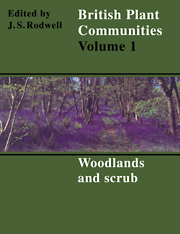Book contents
- Frontmatter
- Contents
- List of Figures
- Foreword
- Preface and Acknowledgements
- Preamble
- General Introduction
- Woodlands and Scrub
- Introduction to Woodlands and Scrub
- Key To Woodlands and Scrub
- Community Descriptions
- W1 Salix Cinerea-Galium Palustre woodland
- W2 Salix Cinerea-Betula Pubescens-Phragmites Australis Woodland
- W3 Salix Pentandra-Carex Rostrata Woodland
- W4 Betula Pubescens-Molinia Caerulea Woodland
- W5 Alnus Glutinosa-Carex Paniculata Woodland
- W6 Alnus Glutinosa-Urtica Jzozca Woodland
- W7 Ainus Glutinosa-Fraxinus Excelsior-Lysimachia Nemorum Woodland
- W8 Fraxinus Excelsior-Acer Campestre-Mercurialis Perennis Woodland
- W9 Fraxinus Excelsior-Sorbus Aucuparia-Mercurialis Perennis Woodland
- W10 Quereus Robur-Pteridium Aquilinum-Rubus Fruticosus Woodland
- W11 Quereus Petraea-Betula Pubescens-Oxalis Acetosella Woodland
- W12 Fagus Sylvatica-Mercurialis Perennis Woodland
- W13 Taxus Baccata Woodland
- W14 Fagus Sylvatica-Rubus Fruticosus Woodland
- W15 Fagus Sylvatica-Deschampsia Flexuosa Woodland
- W16 Quereus spp.-Betula spp.-Deschampsia Flexuosa Woodland
- W17 Quereus Petraea-Betula Pubescens-Dicranum Majus Woodland
- W18 Pinus Sylvestris-Hylocomium Splendens Woodland
- W19 Juniperus Communis Ssp. Communis-Oxalis Acetosella Woodland
- W20 Salix Lapponum-Luzula Sylvatica Scrub
- W21 Crataegus monogyna-Hedera helix scrub
- W22 Prunus Spinosa-Rubus Fruticosus Scrub
- W23 Ulex Europaeus-Rubus Fruticosus Scrub
- W24 Rubus Fruticosus-Holcus Lanatus Underscrub
- W25 Pteridium Aquilinum-Rubus Fruticosus Underscrub
- Index of Synonyms to Woodlands and Scrub
- Index of Species in Woodlands and Scrub
- Bibliography
W11 - Quereus Petraea-Betula Pubescens-Oxalis Acetosella Woodland
Published online by Cambridge University Press: 04 July 2020
- Frontmatter
- Contents
- List of Figures
- Foreword
- Preface and Acknowledgements
- Preamble
- General Introduction
- Woodlands and Scrub
- Introduction to Woodlands and Scrub
- Key To Woodlands and Scrub
- Community Descriptions
- W1 Salix Cinerea-Galium Palustre woodland
- W2 Salix Cinerea-Betula Pubescens-Phragmites Australis Woodland
- W3 Salix Pentandra-Carex Rostrata Woodland
- W4 Betula Pubescens-Molinia Caerulea Woodland
- W5 Alnus Glutinosa-Carex Paniculata Woodland
- W6 Alnus Glutinosa-Urtica Jzozca Woodland
- W7 Ainus Glutinosa-Fraxinus Excelsior-Lysimachia Nemorum Woodland
- W8 Fraxinus Excelsior-Acer Campestre-Mercurialis Perennis Woodland
- W9 Fraxinus Excelsior-Sorbus Aucuparia-Mercurialis Perennis Woodland
- W10 Quereus Robur-Pteridium Aquilinum-Rubus Fruticosus Woodland
- W11 Quereus Petraea-Betula Pubescens-Oxalis Acetosella Woodland
- W12 Fagus Sylvatica-Mercurialis Perennis Woodland
- W13 Taxus Baccata Woodland
- W14 Fagus Sylvatica-Rubus Fruticosus Woodland
- W15 Fagus Sylvatica-Deschampsia Flexuosa Woodland
- W16 Quereus spp.-Betula spp.-Deschampsia Flexuosa Woodland
- W17 Quereus Petraea-Betula Pubescens-Dicranum Majus Woodland
- W18 Pinus Sylvestris-Hylocomium Splendens Woodland
- W19 Juniperus Communis Ssp. Communis-Oxalis Acetosella Woodland
- W20 Salix Lapponum-Luzula Sylvatica Scrub
- W21 Crataegus monogyna-Hedera helix scrub
- W22 Prunus Spinosa-Rubus Fruticosus Scrub
- W23 Ulex Europaeus-Rubus Fruticosus Scrub
- W24 Rubus Fruticosus-Holcus Lanatus Underscrub
- W25 Pteridium Aquilinum-Rubus Fruticosus Underscrub
- Index of Synonyms to Woodlands and Scrub
- Index of Species in Woodlands and Scrub
- Bibliography
Summary
Synonymy
Caithness birch woods Crampton 1911 p.p.; Betuletum tomentosae Moss 1911 p.p.; Scottish beechwoods Watt 1931 p.p.; Highland birchwoods Tansley 1939 p.p.; Highland oakwoods Tansley 1939 pp.; Heathy birchwood Pigott 1956; Betuletum Oxaleto-Vaccinietum McVean & Ratcliffe 1962 p.p.; Betula-herb nodum McVean & Ratcliffe 1962 p.p.; Vaccinium-ncb birchwood association McVean 1964a p.p.; Herb-rich birch and oakwood association McVean 1964a p.p.; Blechno-Quercetum (Br.-Bl. & Tx. (1950) 1952) Klötzli 1970 p.p.; Oxalido-Betuletum Graham 1971 p.p.; Loch Lomond oakwoods Tittensor & Steele 1971 p.p.; Betula pubescens-Vaccinium myrtillus Association Birks 1973/?./?.; Corylus avellana-0xalis acetosella Association Birks 1973 p.p.; Hazel-ash woodland Peterken 1981 p.p.; Oak-lime woodland Peterken 1981 p.p.; Birch-oak woodland Peterken 1981 p.p.; Birch woodland Peterken 1981 p.p.; Woodland plot types 21, 22, 23, 26 & 29 Bunce 1982; Trientali-Betuletum pendulae Birse 1982 p.p.; Luzulo-Betuletum odoratae Birse 1984 p.p.; Blechno-Quercetum (Br.-Bl. & Tx. (1950) 1952) Birse 1984p.p.; Lonicero-Quercetum (Birse & Robertson 1976) Birse 1984 p.p.
Constant species
Betula pendula!pubescens, Agrostis capillaris, Anthoxanthum odoratum, Deschampsia flexuosa, Galium saxatile, Holcus mollis, Oxalis acetosella, Potentilla erecta, Pteridium aquilinum, Viola riviniana, Hylocomium splendens, Pseudoscler opodium purum, Rhytidiadelphus squarrosus, Thuidium tamariscinum.
Physiognomy
The Quercus petraea-Betula pubescens-0xalis acetosella woodland is almost invariably dominated by either oak or birch or various mixtures of the two. Of the oaks, Quercus petraea is very much the more frequent and characteristic species and it can be an abundant component of this community in south-west England, Wales, the Lake District and into southern and central Scotland. Sometimes, it forms a high forest canopy of tall, well-grown trees; in other stands, it dominates in oak coppice with a fairly low cover of thin or multi-stemmed and often crookedly-growing individuals.
Moving north-westwards, Q. petraea becomes rarer and increasingly confined to lower altitudes: in the southern and east-central Highlands, it can dominate in this community up to about 275 m, but in the far west, its general limit is around 150 m (McVean 1964a). However, there is every indication that oak has been extensively removed from woodlands towards the northwestern limit of this community, so its absence there is probably partly artificial (McVean & Ratcliffe 1962, McVean 1964a).
- Type
- Chapter
- Information
- British Plant Communities , pp. 197 - 216Publisher: Cambridge University PressPrint publication year: 1991

